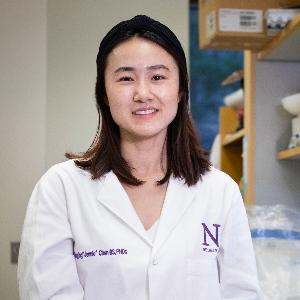
October 2023 Newsletter

October 2023 Newsletter

Student Profile
Zhangying (Jennie) Chen is a fifth-year PhD-MPH student in the Driskill Graduate Program.
An early interest in biology first led Chen to the University of Illinois at Urbana-Champaign, where she completed her bachelor’s degree in integrative biology.
Through her work in the laboratory of Steven Schwulst, MD, associate professor of Surgery in the Division of Trauma and Critical Care, Chen has identified potential cellular culprits for predicting traumatic brain injury outcomes in aged mice.
Where is your hometown?
I was born and raised in Taizhou, located south of Shanghai, China.
What sparked your interest in science or medicine?
I did well in biology at high school, which led me to major in biology in college. I enjoyed taking my biology classes and developed a comprehensive understanding of different fields within biology. When faced with the real question: what am I going to do with my bachelor's degree in biology? I started exploring different career options by working as a research assistant, joining various student clubs, engaging in community and volunteering activities and meeting with different people. In the end, I realized it was the pure biologic questions that intrigued me the most. Still, it wasn't until my first year at Northwestern as a master's student that I realized I was passionate about benchwork and analyzing and interpreting my experimental results. As I am discovering, I have noticed that all my interests converged to a career in scientific discovery. I became dedicated to pursuing a PhD and a lifelong journey through biomedical research.
What are your research interests?
My ultimate research interests are mechanistic and therapeutic discoveries for neurologic disorders, with a focus on neuroinflammation and neuroimmune interactions. Many neurologic disorders, such as Alzheimer’s disease, still lack any significant therapeutic options and ultimately result in significant morbidity and mortality.
What are you currently working on?
My PhD research centers around traumatic brain injury (TBI). TBI afflicts about 69 million people worldwide yearly. While TBI affects individuals of all ages, the elderly (65 years and older) experience higher mortality and more severe consequences, including TBI-related dementia, than younger individuals with similar injury severity. Understanding of the disparate response between elderly and young patients after TBI is still in its infancy. Utilizing a well-established mouse model of TBI in the laboratory of Dr. Steven Schwulst, I have uncovered potential cellular culprits for worse TBI outcomes in aged mice – the disproportionate number of CD8 T-cells within aged brains after TBI. These T-cells come from the peripheral blood and infiltrate the brain as the blood-brain-barrier is damaged after TBI. Inhibiting the infiltration of these CD8 T-cells via an FDA-approved drug called Natalizumab (a monoclonal antibody against the adhesion molecule integrin α4, also known as CD49d) significantly reduces mortality in the aged mice but not young mice post-TBI. This treatment also improved long-term neurocognition and motor outcomes in aged mice post-TBI.
Please tell us about a defining moment in your education at Feinberg thus far.
I did not have a pre-defined project when I first joined my lab. Instead, my thesis advisor, Dr. Schwulst, allowed me to delve into the bioinformatic analyses of our lab's transcriptomics data. I was also encouraged to initiate my own research line and find my research passion. That includes asking an exciting, scientifically testable questions and proposing simple, yet rigorous and well controlled, experiments. Moreover, I was encouraged to ask the “why” and “what if” questions – to be innovative without boundaries. Based on this background, I proposed my thesis based on an observation from our bioinformatics analyses – the T-cell infiltration observed within the aged brains, but not the young brains, of mice after TBI. On top of that, my thesis advisor and lab mates trusted me to be thorough and rigorous in my experiments, devoting their time and resources to my growth and success as a scientist. The training I have received from my current lab constantly motivates me to pursue a career in scientific research and addresses the importance of doing meaningful science.
What do you hope to do with your degree?
With my PhD in integrative life sciences, I hope to continue expanding my knowledge base in neuroinflammation and neuroimmunology and to continue to hone my skills through a post-doctoral fellowship. My ultimate career objective is to become a leader in the field and an independent scientist with my own laboratory investigating important questions at the intersection of neuroscience and immunology.